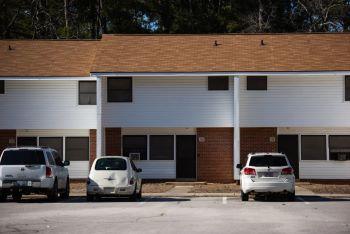 With more than 5,000 pending applications from rent-burdened households, Cumberland County is expected to take over administration of its pandemic rental assistance program next month.
With more than 5,000 pending applications from rent-burdened households, Cumberland County is expected to take over administration of its pandemic rental assistance program next month.
The county and the city of Fayetteville pooled their federal rental aid to form the Fayetteville Cumberland Rental Assistance Program, or RAP, last June.
The program was initially funded with two rounds of federal rental aid, one from the December 2020 COVID-19 stimulus package and the other from the American Rescue Plan Act. In total, RAP received over $18 million in direct federal aid.
The funds are for low-income tenants who have fallen behind on rent due to the COVID-19 pandemic. Renters are eligible for up to 12 months in past due rent and three months in future rent.
The city and county had previously contracted administration to Innovative Emergency Management, a private company based in Morrisville in Wake County.
But IEM decided not to renew past the depletion of the program’s current funding. In an emailed statement to Carolina Public Press, the company said its decision was due, in part, to restrictions the N.C. General Assembly placed on the next $17 million.
During the first two rounds of assistance, IEM said, the company fronted $13 million, at no additional cost to the city or county, to get the program up and running. Fayetteville and Cumberland later reimbursed that spending.
IEM officials said they also decided not to renew as more upfront spending would have been required.
“IEM is committed to stabilizing housing and is proud to have been a part of the city of Fayetteville’s and Cumberland County’s COVID-19 recovery efforts,” company officials said.
Reduced administrative fees
From both rounds of federal assistance combined, North Carolina’s state government received over $1 billion in rental aid.
Most of that was used for North Carolina’s own statewide rental assistance effort, the Housing Opportunities and Prevention of Evictions program.
Portions of it, however, were allocated to the state’s most populous counties, Cumberland among them, as part of state legislation last year, Senate Bill 172.
In that legislation, Cumberland was allocated more than $31 million, $17 million of which will be disbursed by the county’s Department of Social Services after IEM finishes administering the last of the current funds.
The law also reduces administrative fees to 5%, down from the 10% in the U.S. Treasury guidelines for state and local governments.
IEM said this reduction would render the company unable to cover the cost of disbursement, which, the company said, includes call center and case management services, among others.
To begin administering the aid, DSS Director Heath Skeens told the Cumberland County Board of Commissioners at its monthly agenda meeting last week that DSS would need to hire 25 temporary workers.
In a statement emailed to Carolina Public Press, Cumberland officials said all positions except for three would be funded with administration fees.
It hasn’t been determined whether additional county funds will be needed to fund the remaining three positions or whether the DSS budget can handle it, officials said.
Skeens said she hopes to have the positions filled by March 28.
The Board of Commissioners voted 5-0 in support of having DSS take over RAP’s administration. Commissioners Michael Boose and Charles Evans were not present for the vote.
The action will be on the consent agenda for Monday’s board meeting.
IEM said the company is working with DSS in the transition.
“IEM and the county are working together to pivot program administration to DSS,” company officials said. “IEM is working with DSS to provide the necessary training and resources to support a successful handoff.”
Pending applications
Due to depleting funds, RAP halted applications to the program in January.
As of last week, 5,165 applications were pending. About 180 applicants will be sent checks in the next two weeks from the remaining $1.3 million in the last round of assistance directly from the federal government, IEM said.
DSS expects to begin processing the remaining applications as the agency begins going through the next $17 million from the state, Skeens said.
“Our plan is to begin to process those applications as quickly as possible, to identify and to ensure that we are distributing the money to those in need, as quickly as we can,” Skeens said. “But again, there are 5,100 applications, and that is not going to happen in 30 days. It’s going to take some time.”
Cumberland officials said it remains to be seen when applications will reopen.
“We are unsure when and if the portal will be opened for new applications,” an email from the county said. “That will depend on if there is any money left.”
The next $17 million in funding will be depleted by the 5,100 pending applications, they said.
So far in the program, 2,631 households in Cumberland County have received aid. Each family has received an average payout of about $5,200.
Out of the federal aid received, Cumberland County officials said $1.3 million was remaining as of last Thursday, and IEM expects to send that money to landlords and tenants within the next two weeks.
That’s the last 7% from the first two rounds of federal rent aid as IEM has disbursed 93%.